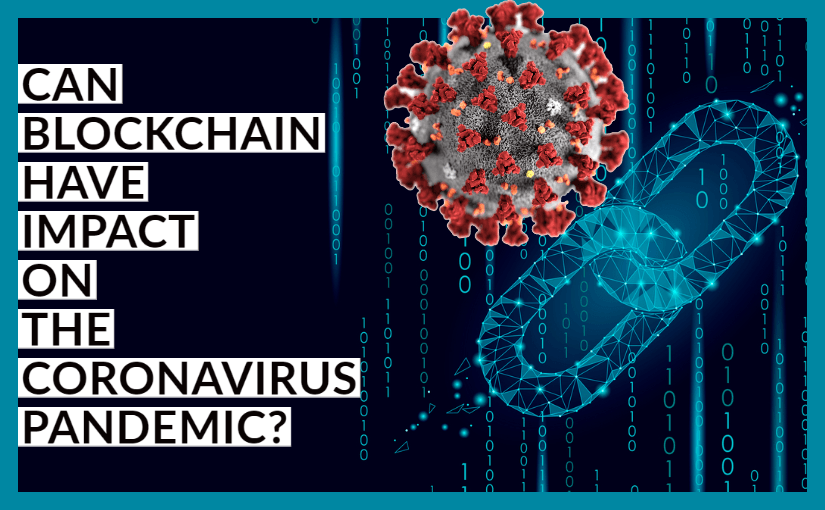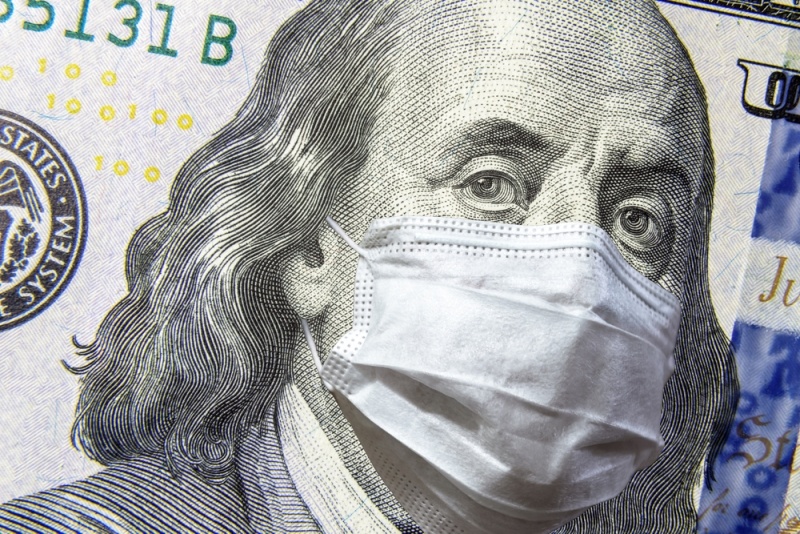How Much Impact Can Blockchain Make to Reduce the Impact of The Coronavirus Pandemic?

The pandemonium trailing the uncontrolled spread of Coronavirus has opened our eyes to the state of our healthcare systems. The chaotic state of the global medical supply chain, the inaccessibility of accurate health statistics, and the influx of fake news are some of the issues stifling the fight against the novel virus. As such, it has become clear that traditional health systems are redundant and ineffective when dealing with crises of this proportion. At this junction, it is imperative to adopt more versatile and productive technologies designed to optimize our understanding of Coronavirus, the containment strategies already in place, and our defense system against future pandemics.
Herein lies the validity of the recent clamor for increased adoption of technologies like Artificial intelligence, Blockchain, Big Data, and IoT. In this article, I will fixate on the growing relevance of blockchain in the ongoing scramble to put an end to a somewhat unstoppable pandemic.
The Present State of The Global Health Industry

Countries are increasingly adopting the lockdown strategy, which proved effective in lowering China’s recorded cases of infected people and fatalities. The disease, which has infected over 350,000 people worldwide and killed over 16,000, has forced nations to close their borders, issue social distancing as a precautionary measure, and close down businesses/schools. Although these measures have helped to curtail the spread of the virus in some countries, there is, however, the need to do more to boost the chances of reducing the spread of the virus on a global scale.
While this is a given, it is glaring that established health infrastructures are not equipped with mechanisms effective enough to put and to the current health crisis. Reports reaching us from various regions of the world documents the failings of health systems and how they are buckling under the mounting pressure from the rising number of infected cases. Even developed countries, which have always identified as gold standards for other nations, are not left out of this onslaught. Hence, it is imperative to identify the factors that have crippled the efficacy of the current health systems in most regions amid the influx of Coronavirus infection cases. In this article, I will segment these frailties into two. The first centers on the unavailability of a dynamic health surveillance system, while the other encapsulates the outdated state of existing medical supply chains.
The Rigid Nature of The Health Surveillance System

Health surveillance is critical as it provides practitioners and scientists with all the data they need to circumvent hurdles like the ones being faced currently. These systems help stakeholders to access vital information that includes the actual figures of people treated, those responding to treatment, the effective mode of treatment, and so on. These sets of data help put into perspective the scale of the pandemic, the root cause, the treatments proving to be the most effective, and much more.
However, owing to the inability of the existing health surveillance system to cope with the explosion of information trailing the emergence and spread of the Covid-19 virus, the health sector has since found it difficult to carry out the following:
Optimize Data Management
Since the Covid-19 scourge has become a pandemic threatening the very existence of humanity, there are lots of factors and events that health practitioners around the world ought to log and share with the global community. It is not only imperative for this information to be made available, but also, all progress and failings should become visible. Doing this will help experts, governments, and other authorities to make decisions and carry out analysis based on up-to-date data. Though optimal data management is a core requirement in the fight against a pandemic like the Coronavirus, the lack of a trust-enabled unified source of information for everyone responsible for unraveling the virus or recommending effective measures of containing it has made the situation worse. As such, it is difficult to filter facts from fiction or useful data from the non-relevant ones. Needless to say, this has further burdened medical experts and authorities tasked with finding a cure or developing solutions that will immensely slow down the spread of the virus.
One thing that has pushed the health sectors of various countries to the brink of collapse is the centralized and isolated frameworks governing their operations. It seems like we have lost all sense of togetherness in a period when our biggest foe is a global health crisis. Consequently, the non-uniformity of measures and resources implemented in nations around the world has created an immeasurable gap between where we want to be and where we are. To circumvent this drawback, we must do away with centralized data management systems currently causing divides and settle for decentralized mechanisms unsusceptible to politics and restrictions. With this in place, the global community can finally implement promising solutions via the sharing of information, experience, and resources.
Underreporting
The criticisms leveled against the Chinese government and its handling of the outbreak of coronavirus show the importance of transparency at a time like this. Some governments might decide to underreport the situation within their jurisdiction just to save face or curtail widespread panic. Regardless of how justified the reasons are, altering Covid-19 statistics does more harm than good. For one, citizens would remain oblivious to the true extent of the health crisis in their immediate environment and might ignore preventive measures.
Redundant Healthcare Technologies
From what we have learned so far, it is safe to conclude that a majority of governments have not invested enough in their healthcare systems. This assertion stems from the fact that we still have countries relying on manual data management processes and systems. Inactions during a time that experts were clamoring for the digitization of conventional systems have come back to haunt them.
The Frailties of Medical Supply Chains
The health supply chain has come under scrutiny since the Covid-19 disease became a global pandemic. The shortage of health supplies has indicated issues plaguing the current system involving the identification of regions with high demand, the verification of the credibility of medical equipment manufacturers, and the tracking supplies en route to their destinations. For one, some countries are finding it difficult to enable mass testing for determining the number of citizens infected with the Coronavirus. The same applies to nations unable to guarantee that the infected will access medical treatment as a result of a shortage of respirators and other crucial medical supplies. Importantly, the breakdown of the global supply chain in a time like these exposes health practitioners to this infection due to the influx of low-quality protective gear.
According to a Forbes report, the failings of medical supply chains have contributed to the conundrum faced in several counties. The article reads:
“Traditional tools of Excel Sheets and Google Forms are currently being used to govern supplies, with legal contracts being uncertain, inability of individuals to fly to verify factories’ capacity and breakdown of trust of the trade finance and letters of credit traditional payment mechanism. Lack of trust is the biggest bottleneck preventing this market ramping up quicker, and speed is of the essence in the next few weeks.”
These frailties have led to renewed interest in identifying new ways to optimize or overhaul existing infrastructures and systems.
Blockchain Can Optimize the Healthcare Sector

Blockchain technology’s unconventional and dynamic approach to age-long problems is potent enough to alter and improve the performance of various industries. It is this apparent capacity to eliminate bottlenecks that puts it at the forefront of technologies capable of revamping the outdated healthcare sector.
Blockchain Offers A Single Source Of Information
I mentioned earlier that the centralized and isolated nature of health records management systems have stifled the effectiveness of our response to the spread of the novel coronavirus. Instead, what we need is a decentralized single source of information that promotes collaboration on a global scale. Without any doubt, this is where blockchain shines. The technology has all the features necessary to provide interoperability without running the risk of encountering snags like doctored records, lost data, and other issues associated with centralized systems.
Blockchain offers consensus mechanisms ideal for verifying the integrity of records. Likewise, it provides real-time updates, which is crucial for fast-tracking the response of authorities and health practitioners to new findings on Covid-19. Note that blockchain also enables immutability, thereby eliminating the risk of lost or altered records. Hence, blockchain establishes the right data management model to record patients’ history, the incorporated treatment regimen, and progress reports. Furthermore, blockchain is quite effective as a data storage system for stats on the death toll, the number of confirmed cases of infected people, the number of people tested, and so on.
Furthermore, the technology promotes transparency and trust among all parties as it implements a decentralized system where data are broadcasted to the network of stakeholders directly. In other words, it is almost impossible for a central authority to filter information, especially if every medical practitioner has access to log new updates, which will undergo further verification from all participants of the network.
Revamping Medical Supply Chains
The existing medical supply chain is nothing to write home about. Governments are just scampering to either import medical supplies or have companies within their jurisdiction up their production rate and deliver supplies at record time. At this very moment, little attention is being paid to the quality of materials used to make these products, the safety of such products, and the possibility of exposure to contaminants.
With blockchain, streamlining medical supply chains is an achievable task. The technology has the features to help track epidemic prevention supplies right from the factory to stores or hospitals. Blockchain can ensure that these products are authentic and tamper-proof all through their journey via the supply chain. Importantly, blockchain-enabled supply chain surveillance is ideal for tracking the demand for medical products. As such, it becomes easier to identify regions where such products are in high demand and ensure that supply chains adjust accordingly.
What About the Concern About Privacy?

While no one is underscoring the suitability of blockchain in the ongoing fight against Covid-19, some skeptics, however, question the uncertainties as regards privacy. It is imperative to explore the place of blockchain’s immutable and public ledger and how it clashes with the stance of regulators on privacy. Questions to ask here include: Will patients have a say in the scope of the information entered into a public blockchain network? If so, won’t blockchain’s immutable nature defy the privacy rights of patients?
However, as aptly explained by the CEO of ConsensSys Health, Heather Leigh Flannery, there are ways to ensure that blockchain complies with regulations bordering on public health data. Heather asserted:
‘The current ethos is to give up all our personal privacy. This is problematic in the long term, and we should be prioritizing technology that can help us advance public health while preserving personal privacy. Blockchain alone does not deliver this privacy. However, this technology used in concert with two other families of technology: zero knowledge cryptography and federated analytic and machine learning does.’

In the US, the Cybersecurity and Infrastructure Security Agency (CISA) have listed blockchain managers in the agriculture and food distribution sector as part of the essential workforce advised to continue with their schedule. The realization that blockchain experts for the food supply chain are crucial to the smooth running of a delicate economy highlights the growing impact of the technology and its mainstream successes.
Following CISA’s announcement, 8 states, including Massachusetts, Ohio, Louisiana, California, Indiana, Washington, Delaware, and Washington have all reiterated this directive and exempted blockchain managers from the implemented stay-at-home exercise. These developments outline the progress made in the food supply chain compared to blockchains almost non-existential status in the health sector.
Already, big names like Walmart and IBM have invested time and resources into creating blockchain-enabled systems to track and ascertain the quality of food and agriculture produce. Considering the number of ways blockchain technology can boost the efficiency of the health sector and avert crisis, it is clear that it is high time we incorporate blockchain into existing heath infrastructures or overhaul outdated systems for new ones.
